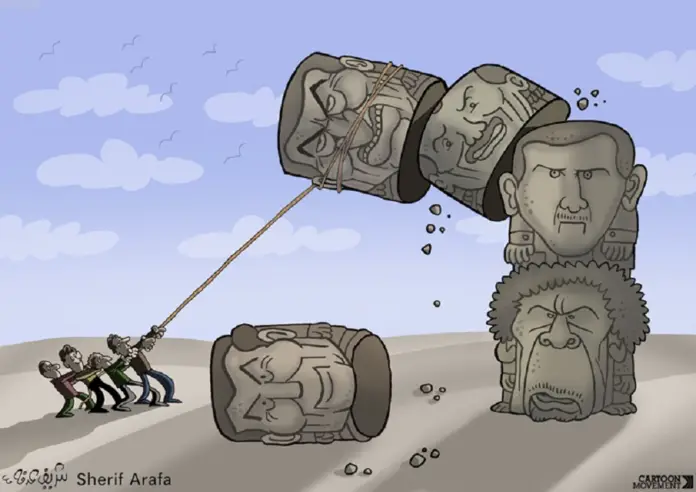Former US president George W. Bush stated in his speech at Cincinnati, Ohio in 2002 that “the United States and our allies will help the Iraqi people rebuild their economy and create the institutions of liberty in a unified Iraq at peace with its neighbors.” Two decades down the road, these words still sound familiar, but with a bit of change in the context and content, seemingly applicable universally. We saw it coming in Afghanistan, we heard this for Libya, we saw Syrians scampering under the same threat and we felt South American nations bracing for the resonance of the same. Last but not the least, we also got hit by the same bullet, lately.
Regime changes can trigger or can be triggered endogenously or exogenously; a combination of both. However, there is a set of conditions which acts as a common denominator. I will try to enumerate and analyze this set of conditions and its applicability. Nations’ history and culture, genesis and evolution of political thought defining the aspirations of people, and the state of its institutions, help quantify the outcomes on a scale with, most likely, likely, possible or impossible graduations. Civic culture is of paramount importance in this regard. A kingdom which is supportive of divine right of its royalty, to rule the country is less likely to adopt a regime change for democracy.
An undemocratic mindset, therefore, cannot harbor democratic dispensation of governance. The engagement of citizens in public affairs is imperative. The people tend to remain so pre occupied with their business interests that they hardly feel enabled for change, hence civic engagements remain low. Political equality for all, is another determinant of civic culture, meaning thereby, that no one is above the law. Every citizen enjoys the same rights and obligations to deliver, regardless of caste, creed, gender and faith. Empathy or solidarity for each other is yet another hallmark of civic culture, owing to which people tend to lend a helping hand to each other and stand by each other.
In addition to civic culture, economic conditions are also a precursor to regime change. Owing to improved economic conditions, people are likely to get out of their rut of making both ends meet, i.e. basic needs like food, shelter and security, thus society sits prepared for its transition to true democracy. People can start thinking of mutual or collective benefits, over and above their own business interests. Processes driving economic modernization can make a major impact for a regime change to get triggered.
Another key source of internal regime change is the military apparatus of a country. In most cases a regime change through a military coup triggers a reverse change, i.e. from democratic to an undemocratic regime.
Military coups have been historically frequent in Latin America, Africa and Asia. Several coups were staged between WWI and WWII in European countries like Spain, Greece, Portugal and Latvia.
Military leaders initiating the coups see themselves and the military as uncontroversial and selfless in the eyes of the citizens and hence feel credible to take over. The external triggers for regime change can be summed up under a single heading i.e. US Foreign Policy; with overt or covert aid, regime change operations are launched with the help of local players in the quest to safe guard US national interests in destabilized regions, of geo strategic importance.
These are aimed at installing regimes of own liking who once economically strangulated, are more willing to conform to conditions spelled out by USA. Another outcome of such regime change operations can be aimed at reducing the influence of another power in the region. Rest of the external reasons like globalization and world economic order can be encapsulated within the above premise. It can thus be concluded that home grown causes of regime change are more broad spectrum as compared to those which stem externally. Having enumerated the internal and external dynamics of regime change, let us briefly apply these on Pakistan’s socio political scenario. Despite the fact that our civic culture being supposedly symbolic of our great religion Islam, is still surviving in throes of class differentiation.
We as a society are subservient in essence to our own interests, coupled with economic constraints, masses have remained indifferent to regime change; undemocratic to democratic or vice versa. As a nation we are in love with status quo and repeated elections have not enabled us to part ways with it and its supportive forces. People believe that law of the land is not equally applicable, but rather is heavily tilted in favor of elites and hence have opted to remain on the sidelines. Empathy or solidarity in the society is fast eroding. Economic compulsions keep the masses focused on operating in survival mode, making corruption rampant and acceptable in the society. Military is no longer interested to take the reign in its hand, conforming to the modern day trend that martial law has no acceptability in the world.
However, it still remains the main player in tweaking the politics at the back end. Pakistan, owing to its geo-strategic importance, has been a ‘battle ground’ for world powers, under a heavy influence of USA. It, therefore, becomes evident that why an internal regime change has remained unlikely all these decades. Owing to our economic fragility, and nuclear power status, USA will keep striving for regime changes overtly or covertly through local players, in future too. Next few months, however, shall be decisive that how long will this continue, as the people of Pakistan move towards taking their destiny in own hands, finally.







